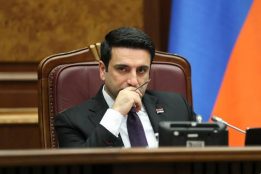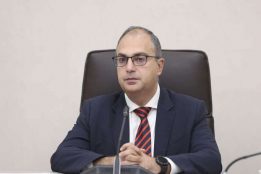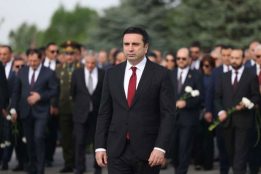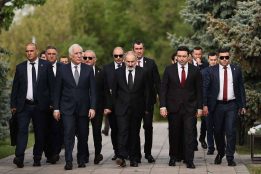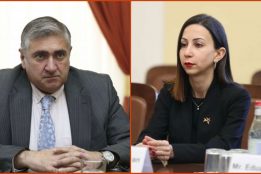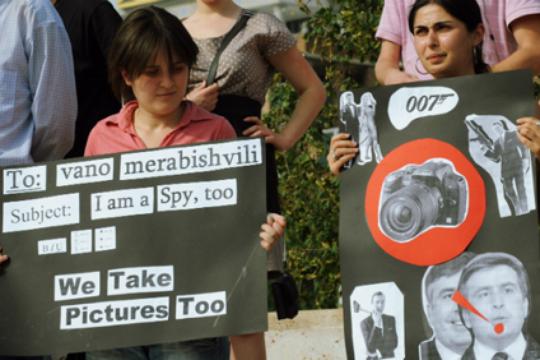
Michael Cecire, an independent Black Sea-Eurasia regional analyst and an associate scholar at the Foreign Policy Research Institute in Philadelphia, touched upon new developments in Georgia.
Weeks after elections in Georgia brought billionaire Bidzina Ivanishvili’s Georgian Dream coalition to power, the arrests of numerous senior officials from the former regime of President Mikheil Saakashvili have unleashed a wave of concern and criticism in the West. But the critics’ quickness to pile on the new government glosses over the serious abuses perpetrated by the previous government and fails to give due process a chance.
Since the arrest in early November of Georgia’s former defense and interior minister, Bacho Akhalaia, and a string of other ex-officials, a rash of articles and op-eds have appeared in the Western press warning against the specter of political vengeance from the Georgian Dream, which now holds a majority in parliament. Unsurprisingly, neither media clamor nor stern words from Western leaders have done much to stem the tide of arrests, and now it’s been announced that former longtime Interior Minister (and briefly Prime Minister) Vano Merabishvili has also been brought in for questioning. For most observers, the optics of a campaign of arrests do not bode well for a new political movement aggressively (and likely unfairly) branded as Russian proxies by the ruling-turned-opposition United National Movement.
But for all the public dismay and expressions of concern, there has been a surprising lack of due diligence about who’s being arrested and why. While the lion’s share of English-language coverage has cast the situation as a politically motivated purge against a besieged pro-West administration, the reality is actually far more complex. Upon examination, the UNM’s own record does much to dispel the notion of Akhalaia, Merabishvili, and their ilk as unfairly accused, embattled democrats.
It is rarely mentioned now, but the much-feared Akhalaia and Merabishvili were responsible for creating an extensive — and very likely illegal — surveillance and security apparatus in Georgia, thus substantially contributing to the same climate of state impunity that helped propel Georgian Dream to a surprise victory in the October 1 elections. Akhalaia, a close ally of President Mikheil Saakashvili and onetime head of the country’s penitentiary system, resigned as interior minister after disturbing images of systemic abuse in Georgia’s swollen prison system were leaked. Though Akhalaia served as interior minister when the scandal emerged, civil society groups and protesters alike demanded his resignation for his role as de facto prisons boss. After initial resistance, he complied. (Actual prisons minister Khatuna Kalmakhelidze, widely perceived as having little real power, also resigned.)
On cue, the interior ministry responded to the scandal by releasing its own set of conveniently available recordings and arresting opposition members. This continued a longstanding and curious Interior Ministry tradition of releasing damning audio or video evidence for seemingly every contingency. That Akhalaia’s own downfall was precipitated by leaked videos contained more than a little irony.
Merabishvili, easily the longest-serving member of Saakashvili’s cabinet, was an all-powerful interior minister. He has been alternately credited with spearheading the country’s successful police reforms as well as presiding over a host of abuses of power. Aside from bearing responsibility for the climate of fear engendered by this ubiquitous national security state, Merabishvili — as well as Akhalaia’s brother Data — has been implicated in the controversial death of 28 year-old Sandro Girgvliani at the hands of senior Interior Ministry officials following a reportedly tense exchange involving Merabishvili’s wife in a Tbilisi café in 2006. The case, which came to symbolize a culture of official impunity and a pliant judiciary, ended with the jailing of a few interior ministry officials, leaving Merabishvili’s role mostly ignored. Echoing this sentiment, a 2011 ruling by the European Court of Human Rights agreed that the case was insufficiently and deliberately ill-investigated. Even more ominously, a United Nations probe has also linked Merabishvili’s interior ministry with a 2008 attack on two buses carrying ethnic Georgian residents from the breakaway Abkhazia region, which Tbilisi had originally blamed on separatist forces.
More broadly, the unfortunate reality is that the previous government has not lived up to much of its lofty pro-democracy rhetoric. While the UNM’s enthusiasm for the West and relative success in modernizing Georgia may have made an indelible impression on their counterparts in Washington and Brussels, the UNM’s decidedly pro-Western brand-building should not be confused with actual democratization, as extensive reports of an anti-democratic pre-election environment attest. And for all of the UNM’s keenness for international indices and rankings, most democracy measures paint a very different picture than the one usually broadcast by the UNM and its allies.
According to Freedom House, Georgia has made no progress with democracy development since 2005, and press freedom remains roughly the same as it was under the kleptocratic pre-Rose Revolution presidency of Eduard Shevardnadze. Other assessments are even less encouraging: The Economist Intelligence Unit’s Democracy Index shows Georgia backsliding from 2006 to 2011. And Reporters Without Borders shows major regression in press freedoms in Georgia since 2003. The country now languishes just below 104th place, underneath such paragons of liberty as unrecognized North Cyprus, Chad, and Ecuador. Even Georgia’s economic reforms, widely praised for its pro-business posture, look hollow on closer examination. Indeed, the effort to portray billionaire prime minister Bidzina Ivanishvili as the planner of a Viktor Yanukovich-style anti-democratic counterrevolution is hardly supported by the UNM’s own poor record. Given the climate of impunity that permeated much of the UNM’s tenure, the new government is both politically and morally obligated to investigate and address these past wrongs.
This should put the new government’s arrests in a more appropriate context. While no good adviser should be surprised by reactions to the arrests, the Western outcry has nonetheless been much too hasty. Ultimately, it’s not the arrests themselves that will test the new government’s commitment to democratic ideals and the rule of law so much as the Georgian judiciary’s commitment to transparency and due process. On that count, issuing harsh judgments now would be premature, and could aggravate already raw feelings in Tbilisi, where many feel that the West was much too close to the UNM and often too passive to its excesses.
The accusatory and very public denunciations of the new government — which overcame significant structural odds to win the elections, by the way — can easily be construed by Georgian Dream as evidence that reflexively pro-UNM sentiments remain engrained in some quarters of the Western media and governments. From Georgian Dream’s point of view, the UNM received little more than the rare wrist-slap during a tenure pockmarked with abuse, not to mention a war with Russia, yet the new government’s attempt to bring those responsible to account draws howls of protest. Unfortunately, it would be hard to say that they don’t have a point.
There’s no question that democracy in Georgia still has a long way to go. UNM misrule aside, the new government’s reactions and rhetoric fail to appreciate legitimate worries that Georgia is swinging from one autocrat to the next. Still, the burden of democratic maturity should rest with the West and not Georgia’s six week-old government or its green prime minister. By all means, Tbilisi’s actions should be monitored and held to its constitutional obligations, but it remains much too early to declare Georgia’s first modern constitutional change of power a failure and risk alienating a Georgian leadership already sensitive to demonstrations of Western partiality. If the West is genuinely concerned about the fate of Georgia’s political development, it’s important to give Tbilisi the time and space to ensure due process is observed and justice is served.

















